

Your ATN@Work: Recognizing anxiety in children and teens with autism. Part 1 of our Q&A with the lead author of much-needed guidelines on recognizing and treating anxiety in children and adolescents with autism Earlier this year, the journal Pediatrics published the first guidelines for identifying and addressing anxiety in children and teens with autism.
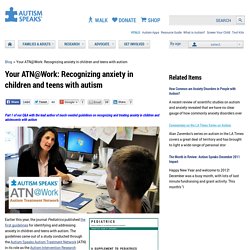
The guidelines came out of a study conducted through the Autism Speaks Autism Treatment Network (ATN) in its role as the Autism Intervention Research Network on Physical Health (AIR-P). Research has long shown that people with autism have high rates of anxiety disorders. Research also suggests that anxiety tends to have different causes and symptoms in those affected by autism than it does in the general population. For these reasons, the Autism Speaks ATN prioritized the development of the diagnostic and treatment guidelines that became part of a special ATN/AIR-P supplement to the February issue of Pediatrics.
Aspergers Victoria - Need A Diagnosis? Diagnosis V Assessment Sometimes there is confusion around these two terms and their meanings.
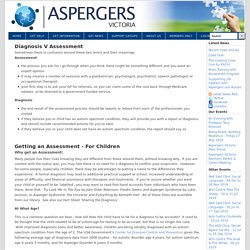
Assessment: the process you ask for / go through when you think there might be something different and you want an expert opinionit may involve a number of sessions with a paediatrician, psychologist, psychiatrist, speech pathologist or occupational therapist.your first step is to ask your GP for referrals, so you can claim some of the cost back through Medicare rebates, or be directed to a government funded service. Diagnosis: the end result of the assessment process should be reports or letters from each of the professionals you visitedif they believe you or child has an autism spectrum condition, they will provide you with a report or diagnosis, and should include recommended actions for you to takeif they believe you or your child does not have an autism spectrum condition, the report should say so.
Aspergers Victoria - Psychologists New. In addition to this listing, you can use the 'Find a Psychologist' search tool at the Australian Psychological Society's website.
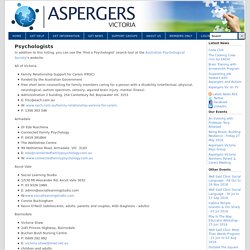
All of Victoria Family Relationship Support for Carers (FRSC)Funded by the Australian GovernmentFree short term counselling for family members caring for a person with a disability (intellectual, physical, neurological, autism spectrum, sensory, aquired brain injury, mental illness)Administration 2 building, 254 Canterbury Rd, Bayswater VIC 3153E: frsc@each.com.au W: www.each.com.au/family-relationship-service-for-carersP: 1300 303 346 Armadale Dr Eda RuschenaConnected Family PsychologyP: 0419 391864The Wattletree Centre99 Wattletree Road, Armadale VIC 3143E: eda@connectedfamilypsychology.com.auW: www.connectedfamilypsychology.com.au Ascot Vale Bairnsdale Victoria Shaw2/45 Princes Highway, BairnsdaleBuchan Bush Nursing CentreP: 0409 292 992E: victoria.shaw@iinet.net.auchildren and adults Ballarat Ballarat Area Balwyn Balwyn North Bayswater Bentleigh Bentleigh East Brighton.
Aspergers & beyond. Self managing futures for young adults funding. How to Calm an Aspergers Child: 50 Tips for Parents. If you have an Aspergers youngster who has an “anger-control” problem, use these tips to (a) prevent anger outbursts and (b) help calm him down once he has launched into a rage or meltdown: 1.
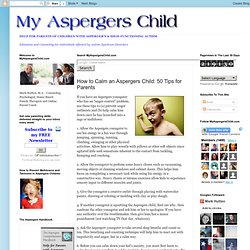
Allow the Aspergers youngster to use his energy in a fun way through jumping, spinning, running, climbing, swinging or other physical activities. Allow him to play-wrestle with pillows or other soft objects since agitated kids seek sensations inherent to the contact from tackling, bumping and crashing. 2. Allow the youngster to perform some heavy chores such as vacuuming, moving objects or cleaning windows and cabinet doors. 3. 4. 5. 6. Chat for Adults with HFA and Aspergers: Meltdowns in Adults with Aspergers & High-Functioning Autism. Can an adult with Aspergers or High-Functioning Autism have a meltdown just like a child with the same disorder?
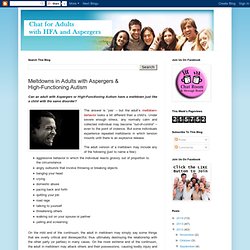
The answer is ‘yes’ – but the adult’s meltdown-behavior looks a bit different than a child’s. Under severe enough stress, any normally calm and collected individual may become “out-of-control” – even to the point of violence. But some individuals experience repeated meltdowns in which tension mounts until there is an explosive release. The adult version of a meltdown may include any of the following (just to name a few): aggressive behavior in which the individual reacts grossly out of proportion to the circumstanceangry outbursts that involve throwing or breaking objects banging your head crying domestic abusepacing back and forth quitting your jobroad ragetalking to yourself threatening otherswalking out on your spouse or partneryelling and screaming Chest tightnessHeadache or a feeling of pressure in the headIncreased energyIrritabilityPalpitationsParanoiaRageTinglingTremors.
Chat for Adults with HFA and Aspergers: The Male Aspie Brain vs. The Female NT Brain. The differences between Aspergers men and neurotypical (NT) women (i.e., women without Aspergers) are not only well-documented, but frequently at the heart of troubled relationships.

Experts have discovered that there are major differences in the way Aspergers men’s brains and NT women’s brains are structured and in the way they react to events and stimuli. Below are the big differences between “male Aspie” and “female NT” brains. Some of these differences have more to do with male vs. female traits, while others have more to do with Aspergers vs. neurotypical traits. 1. Typically, Aspergers men’s brains are about 12% bigger than NT women’s brains. 2. Chat for Adults with HFA and Aspergers: Dealing With An Aspergers Husband: Tips For Married Couples. Life with Aspergers.